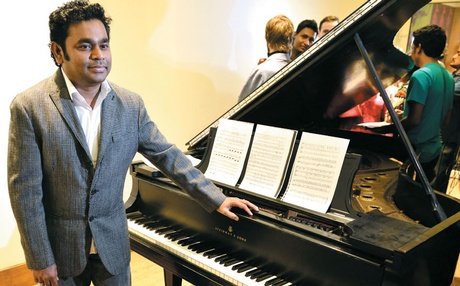
A R Rahman is a spiritual man. That’s probably why he rushed his staff to get their brand new premises of the KM College of Music up and running on Eid. The landscaping may not be perfect, going by the patches of grass on the lawn, the interiors may need a little more touching up and the location (on a rather bumpy gulley off 100 feet road) isn’t exactly posh, but the ‘Mozart of Madras’ is upbeat as he arrives at his new college. “Inshallah, it will all go off well,” he tells his wife Saira as he awaits the arrival of India’s industrial power couple Nita and Mukesh Ambani — the ‘under-wraps’ guests of honour for Rahman’s college opening. With a host of Hollywood and local films to score music for, Rahman took time to reflect on the journey that his ‘pet project’ has taken from a single room KM Music Conservatory, opposite his house, to this magnificent campus. Notes from the maestro’s mind:
How did this project come to be?
I’ve always been interested in music education, because there is this distance between what people in the music industry need and what is being taught. That was the vision behind KM Conservatory. Some time ago, the students staged a full-fledged musical and they managed a spectacular show with such a small rehearsal space on the old campus. I began to think that we could do a lot more with a larger space and that is how this unfolded. We can comfortably teach about 300 students here.
So, It’s a dream come true?
(Laughs) Everything is. This morning when I came here to see how things were going, I was astonished to hear western classical being practised in one room, while sufi music was coming from the floor above…there were so many musical confluences from all around, it finally made sense. There is room for experimentation and growth here, for every talented musician.
Is it financially viable to run such a top-of-the-line school of music?
Honestly, (clears his throat) it’s like I’ve got a knife to my neck when I think about the amount of work and money that we have pumped in. Like everything else, we’ll just have to wait and see. We have a superb studio here that will be rented commercially at night, so that ought to help!
Do you have partners or a franchisee model in mind. Reliance could be interested in this as a brand…
Not at the moment, no. I can say that things are comfortable at the moment and I am able to finance this institute without worry. When I figure out how much it takes to run things here, then I will think about whether we need partnership or any other support. I’ll know in a month’s time.
Do you see KM being in the league of a Berkeley or Julliard School of Music?
I’ve always felt that KM as a concept is in a different direction. Where Julliard and Berkeley have specified directions for where they see their students, we have always had a mix of musical styles – essentially we are Indian at the heart of it, but there is room and space for any kind of world music to play its part. We’re also trying to teach people how to adapt to the needs of any music industry and not just a theoretical one. We have the option of students doing an internship anywhere and even doing commercial work while they’re studying.
Has the attitude towards music education changed since you started KM in 2008?
Not much, but I’d like to think that we have made a difference somewhere. In India, there is this strange attitude that people have where even musician’s have towards their children taking up IT jobs – abroad, people are proud to say that their kids play for the Boston Chamber Orchestra or study at Julliard, but that’s not the case here. I wanted to change that. These days, music is limited only to cinema, cinema and cinema. I wanted to create an interest among people who wanted to make music and help them get to where they wanted to be – successful musicians, whether for music sake, for personal satisfaction or even to play in the industry.
So it’s about recognition of talent for you?
Right now it’s (industry) all about popularity. Things have changed to a small extent where small bands put stuff up on Youtube and if it’s good, it becomes a sensation. If it doesn’t, it just fades. But there is a lot of good stuff and talent out there that needs to be nurtured and we hope to bridge that gap.
Making music without knowing the industry must be tough
It’s a strange thing, but I’ve found that sometimes people with the best talent have dropped off by the industry very early, like the initial rounds of a reality show. Some musicians and singers may be really talented and technically good, but they get knocked out by the commercial aspects and others who aren’t quite talented make it. This needs to change.
You’ve been away from Tamil films for awhile and now you’re returning. Was it a planned hiatus?
Here’s the thing – Hollywood projects come calling only once and you really have to grab on to those opportunities. The good thing about most of those projects is that they take time and allow me a certain space to work. Setting up this kind of an institute could not have been possible without that kind of space or ‘resources’.
source: http://www.newindianexpress.com / The New Indian Express / Home> Entertainment> Interview / by Daniel Thimmayya / ENS – Chennai / August 10th, 2013